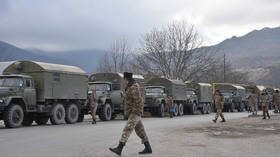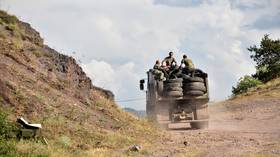EU expands ‘engagement’ in ex-Soviet republic

The EU announced the launch of a civilian European Union Mission in Armenia (EUMA) on Monday. The proclaimed goals of the project include “normalization” in the country amid its long-standing conflict with neighboring Azerbaijan.
“The establishment of an EU Mission in Armenia launches a new phase in the EU’s engagement in the South Caucasus,” the EU High Representative for Foreign Affairs and Security Policy, Josep Borrell, said in a statement.
The mission, established in “response to Armenia’s request,” will have an initial mandate of two years and set up a headquarters in the country.
The move builds and expands upon previous bloc activity in the region, namely the EU Monitoring Capacity in Armenia (EUMCAP) project through which Brussels sent in some 40 civilian observers, following deadly border clashes between Armenia and Azerbaijan.
Armenia, an ex-Soviet republic, is a member of the Collective Security Treaty Organization (CSTO) along with Russia, Belarus, Kazakhstan, Kyrgyzstan and Tajikistan. Earlier this month, Kremlin spokesman Dmitry Peskov reiterated that Yerevan remains Russia’s “close ally.”
Last September, border tensions between Armenia and Azerbaijan flared up again, with the two countries accusing each other of instigating violence after clashes that claimed the lives of dozens of soldiers from both sides. At the time, Armenian Prime Minister Nikol Pashinyan requested military assistance from the CSTO, but the latter refused to send in troops, insisting the situation be diplomatically resolved.
The two nations have historically been at odds over numerous issues, with the disputed region of Nagorno-Karabakh – de jure part of Azerbaijan but populated by ethnic Armenians – being the key point of contention. In 2020, Armenia and Azerbaijan fought a 44-day war over the territory, which ended in a Russian-brokered truce and cession to Baku of some areas previously controlled by Armenian-backed troops. The deal also included the deployment of Russian peacekeepers to area.













